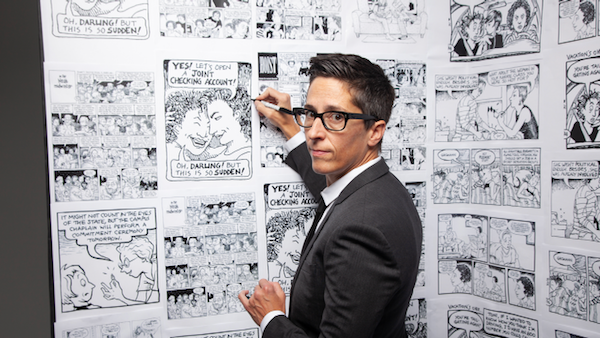Movie review by Greg Carlson
Fans and readers as well as the uninitiated will appreciate veteran filmmaker Vivian Kleiman’s “No Straight Lines: The Rise of Queer Comics.” Drawing from richly detailed and insightful interviews with a quintet of masters, Kleiman elects to cover as much territory and history as possible without taking on the burden of comprehensiveness. Even so, the director’s scope is broad and illuminating. Viewers without any background in mainstream or independent comics should be inspired by the deeply personal — often confessional — descriptions of the art life.
The principal interview subjects are Alison Bechdel, Jennifer Camper, Howard Cruse, Rupert Kinnard, and Mary Wings, but Kleiman also periodically cuts to comments from younger creators who acknowledge specific relationships — and debts of gratitude — to the work of the trailblazers. Additionally, these representatives appearing under the label “Next Gen Comics” articulate with acuity the importance of representation. For example, Ajuan Mance says, “The idea of creating comics that aren’t really about making people heroic is one of the things that I think queer comics have done the best.”
Maia Kobabe adds, “When you are drawing yourself, you can draw yourself however you want. And that is another reason why I think that comics is a media that is so friendly to a queer author.” Kleiman is particularly skillful in grabbing hold of and communicating the universal and the precise. “No Straight Lines” never once feels like homework, even when covering the historical emergence of LGBTQ+ comics or how the impact of the HIV/AIDS crisis motivated raw and haunting expressions of rage, grief, and pain in achievements like David Wojnarowicz’s “Seven Miles a Second.”
For the general audience, Bechdel might be the best known of the featured artists (especially today), but few followers would disagree with Camper’s widely-repeated assertion that Howard Cruse deserves to be known as the “Godfather of Queer Comics.” A monumental figure and mentor to many, Cruse’s death at the age of 75 in November of 2019 casts both a celebratory and elegiac glow over his featured scenes. From his emergence in the 70s underground to his role as founding editor of “Gay Comix” to the publication of the “Wendel” strip in “The Advocate” and the wider reach of “Stuck Rubber Baby,” Cruse’s biography could easily sustain a feature documentary by itself.
Impressively, Kleiman manages to spread the wealth. One could argue that “No Straight Lines” might have benefited from a little more Wings, even though the film does make time to recall the birth of “Come Out Comix” as a direct response to Trina Robbins’s “Sandy Comes Out.” Kinnard explains his motivation for bringing to life characters like Superbad and Brown Bomber. The influence of Bechdel’s “Dykes to Watch Out For” and the multiple successes of “Fun Home” are finely rendered, and the often hilarious and always razor-sharp perspectives of Camper, the founding director of the Queers and Comics conference, may constitute the film’s most valuable set of observations.
One of the most enjoyable aspects of “No Straight Lines” is evident again and again in the close-knit support shared among the “elder statespeople.” The element of game recognizing game in the broadest sense, the mutual admiration of top-flight talent, and expressions of love fill in the spaces between looks at specific titles and publishing milestones. In one example, Kinnard shows a special gift organized by Bechdel, and the placement of the moment within the larger context illustrates Kleiman’s sense of perfect timing.
